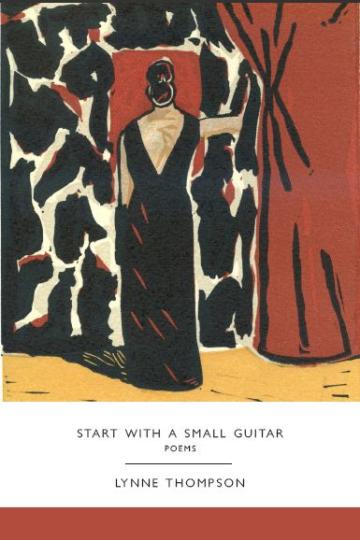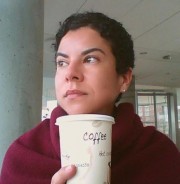Telling Tales: One Writer + One Focus = One Story - Lynne Thompson
Telling Tales: - One Writer + One Focus = One Story
Once upon a time, Lynne Thompson asked herself, “What is missing from my life?” The answer was poetry. Sixteen years later, she is truly a working poet. Ms. Thompson is the author of two full-length poetry collections: “Beg No Pardon,” winner of the 2007 Perugia Press First Book Award and 2008 Great Lakes Colleges Association's New Writers Award, and the forthcoming “Start With A Small Guitar.” She is also a four-time Pushcart Prize nominee, and her list of publications includes the Indiana Review, Crab Orchard Review, Southeast Review, Poetry International, Margie, Sou'Wester, Ploughshares, and Spillway. In these edited excerpts from my recent conversation with Ms. Thompson, she highlights the importance of time, from recognizing moments of opportunity, to giving poems time to talk to each other.
Q. Tell me about the switch from law to poetry.
A. I read voraciously, including poetry, from a young age. I wrote from grade school through college, but went to law school after and that pretty much destroyed the urge. In some ways, law is the perfect degree for a poet because it's about language. After graduation, I worked as a litigator for a very good firm. I remember a judge who denied one of my motions, telling me, "It's a beautifully written motion. It's wrong, but it's beautiful." That stayed with me a long time. After almost 15 years of practice, I woke up one day and decided what I needed in my life was poetry.
Q. It's one thing to realize you need to write; it's another thing to pay your bills. How did you make the necessary, i.e., writing poetry, possible?
A. I liked my lifestyle, but law is a demanding mistress. Poetry and writing require a certain quality of mind. I needed a job that allowed that time. This sounds New Age-y, but I sent my wish for a different kind of job out into the universe. Within two weeks, a head-hunter called about an opening that turned out to be the job I have now as the Director of Employee & Labor Relations at UCLA. I hesitated because I didn't have the experience, and had never done that kind of work before. Then I thought, "Isn't this what you want?" I accepted the interview, thinking the worst that could happen is that I wouldn't get the job.
That was more than eighteen years ago, and I've been able to dedicate my non-work hours to poetry. Before taking the job at UCLA, I might draft three new poems in a productive year. Within the first year of leaving litigation behind, I drafted 80 new poems. They weren't very good, but it was a different life, the life I wanted.
Q. So you wrote poems, worked with mentors, joined writing groups, took workshops. Tell me about the moment you went from writing poems to writing a book.
A. With my first book, I wasn't looking to write a "book". I was writing individual poems and crafting them as best as I could. In 2004, David St. John told me, “It's time for you to publish a book, so just do it.” I'd been studying with him for about seven years at that point. I thought, "Really? Is that how it works?” Books were something other people wrote. I write individual poems. I wasn't writing thematically with a vision toward a cohesive collection. I took a look at my poems and wondered, "How do I make a book out of them?" Lucille Clifton, one of the poets with whom I've studied, said at a reading that she spreads her poems on the floor and lets them talk among themselves to sort themselves out and find coherent arrangement. Well, I spread out my poems, but they didn't say a thing. I thought about how I organize poems for readings, and began to string them together as I would for a reading. I worked in groups of about 15. I did that until I had the section of my first book. It was a process that went through stages, and differed from the way I thought a collection would come into being. I didn't begin with a topic or theme. I learned that if you've been writing for a while, you'll find the natural themes that run through your work.
Q. Is that how it happened with your second book, “Start With A Small Guitar” (due in fall 2013)?
A. The collection's genesis was a little convoluted. The core poems were part of a longer manuscript tentatively titled “Metronome, Lately Adagio.” I was (inappropriately) in a rush to have a new manuscript, but that longer manuscript just didn't work out. I didn't believe in it as a unit. I took the section that was working, and thought I had enough poems for a chapbook. I kept writing until I had enough poems for a full-length book. The other work still lives in my computer. It just isn't its time yet.
What Books Press, an imprint of the Glass Table Collective (http://www.whatbookspress.com/) will publish this latest collection, “Start With A Small Guitar”, in fall of 2013. I didn't think it fit with what I perceived as their “style” – another example of almost getting in my own way when an opportunity presented itself. The Press publishes what I think is more experimental and language-driven work. Well, to my amazement, they accepted my manuscript because they liked what I was doing with language. When I got the form from the Library of Congress that assigned my ISBN number, I felt the excitement of being “one of those people” whose cataloging information included “poetry,” “woman,” and “experimental.” These poems are different for me: they're “broken” in terms of narrative, the way they are spaced on the page, and set typographically; they invoke a dream state.
Q. You described that receipt of your ISBN number made it clear you were “one of those people,” i.e., a published author with a book in libraries and bookstores. Tell me about one of the people who inspired you.
A. Jayne Cortez was a poet I heard my senior year in college. I had never seen a young black woman read poetry. She was accessible. I thought, “This is something I can do.” It was like when a kid who loves flying meets an astronaut: Jayne was that person in the flesh. Years later, I met her stepdaughter who helped me send Jayne a copy of my first book, “Beg No Pardon.” Jayne replied with a lovely note. She died a few months ago. I treasure having shared some time with her. I was lucky to have the chance to thank her and tell her what she meant to me.
Q. What is the moral of your tale, i.e., the nugget to share with emerging writers?
A. The more you write, the better you write, which will make you want to write even more. Write every day. If you just can't write (and revision is included in “writing”), read. Read everything: the back of food cartons, science, psychology, art history, history, comic books, books on travel, newspapers published in foreign countries – better yet, go to foreign countries. Live life as curiously and courageously as you can.

 Nancy Méndez-Booth is a fiction writer. She teaches writing and Latino/a literature and culture in New York and New Jersey. Her work has appeared in Jet Fuel Review, mamapedia.com, The Packinghouse Review, phat'titude Literary Magazine, Philadelphia Stories, Poets & Writers, and realsimple.com. She is looking for a publisher for Underbelly, a collection of linked short stories. She blogs regularly at
Nancy Méndez-Booth is a fiction writer. She teaches writing and Latino/a literature and culture in New York and New Jersey. Her work has appeared in Jet Fuel Review, mamapedia.com, The Packinghouse Review, phat'titude Literary Magazine, Philadelphia Stories, Poets & Writers, and realsimple.com. She is looking for a publisher for Underbelly, a collection of linked short stories. She blogs regularly at